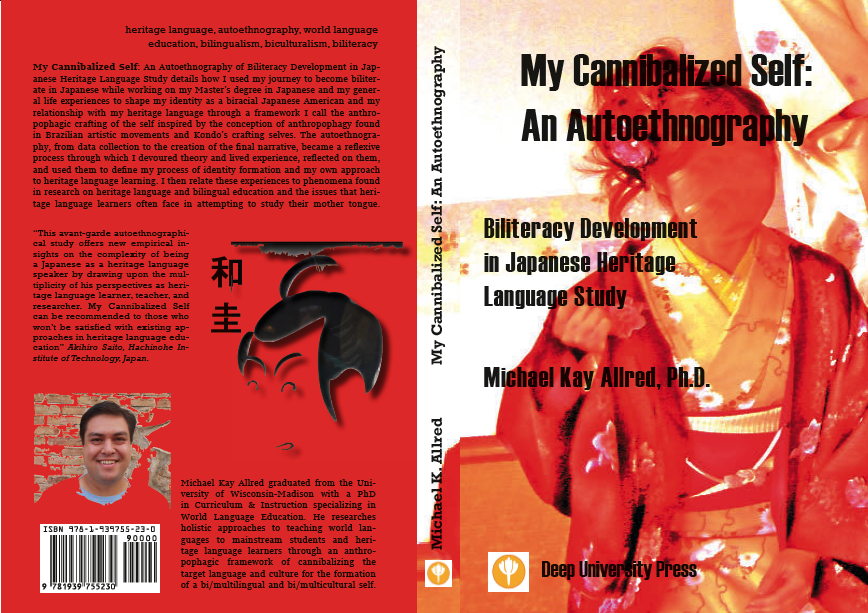My Cannibalized Self: An Autoethnography
Biliteracy Development in Japanese Heritage Language Study
by Dr. Michael Kay Allred
|
My Cannibalized Self: An Autoethnography - Biliteracy Development in Japanese Heritage Language Study details how Michael Kay Allred used his journey to become biliterate in Japanese while working on his Master's degree in Japanese and his life experiences to shape his identity as a biracial Japanese American and his relationship with his heritage language and how these experiences relate to phenomena and issues often faced by heritage language learners in attempting to study their mother tongue.
WHAT OTHERS ARE SAYING…
This avant-garde autoethnographical study offers new empirical insights on the complexity of being a Japanese as a heritage language speaker by drawing upon the multiplicity of his perspectives as heritage language learner, teacher, and researcher. My Cannibalized Self can be recommended to those who won’t be satisfied with existing approaches in heritage language education. - Akihiro Sahito, Centre for Liberal Arts and Sciences, Hachinohe Institute of Technology, Japan One of the predominant tendencies in language teaching is that which highlights the importance of interculturality and of producing speakers who are able to understand and adapt to their role as cultural mediators in globalized contexts. This is where the interest of Allred's book lies, as it presents an original and novel reflection on the nature of the interaction between language and culture in a bilingual person. - Maria Teresa Diaz Mohedo, Professor, University of Granada, Spain This is a bold and political book. It’s bold because Allred here challenges traditional epistemology and canonical ways of doing doctoral research by skillfully linking real life and research. It’s political because it challenges a superficial celebration of diversity and multiculturalism by documenting a heritage language leaner’s voice in socio-political and socio-educational contexts. It has the potential to make a truly significant contribution to our field. -Toshinobu Nagamine, Associate Professor, Kumamoto University, Japan |
"My Cannibalized Self: An Autoethnography details how I used my journey to become biliterate in Japanese while working on my Master's degree in Japanese and my general life experiences to shape my identity as a bilingual, bicultural, and biracial Japanese American and my relationship with my heritage language through a framework I call the anthropophagic crafting of the self. This framework is inspired by the conception of anthropophagy found in Brazilian artistic movements such as Tropicalism and Kondo's crafting selves. The autoethnographic research method, from data collection to the creation of the final narrative, became a reflexive process through which I devoured theory and lived experience, reflected on them through a constant process of revision, and used them to define my process of identity formation and my own approach to heritage language learning. This conception of bilingualism, biculturalism, and biliteracy development is meant to foster an appreciation for the linguistic and cultural heritage of heritage speakers that is often devalued by larger society and the dominant culture while honoring the other influences that make up their dynamic language system and complex identity through an agentive process of cultural transformation in which heritage language learners craft their identities specific to who they are as individuals and how they perform their sense of identity. I then relate these experiences to phenomena found in research on heritage language and bilingual education and the issues that heritage language learners often face in attempting to study their mother tongue as these experiences and issues often determine the relationship heritage speakers have with their heritage language and culture and whether or not they are maintained and passed on to future generations."
|

